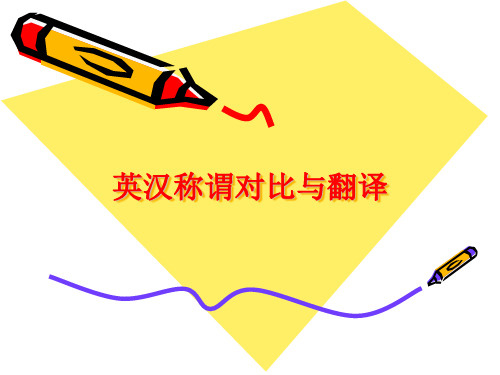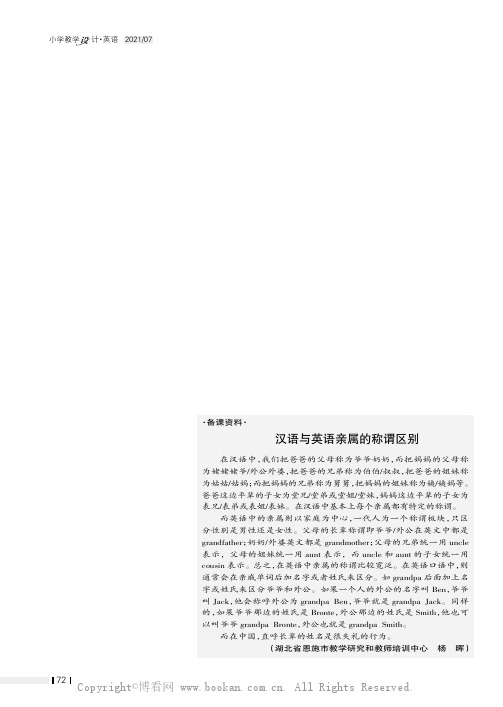汉英亲属称谓的差异及其翻译
- 格式:pdf
- 大小:195.66 KB
- 文档页数:2


小学教学计·英语
2021/07
在汉语中,我们把爸爸的父母称为爷爷奶奶,而把妈妈的父母称为姥姥姥爷/外公外婆,把爸爸的兄弟称为伯伯/叔叔,把爸爸的姐妹称为姑姑/姑妈;而把妈妈的兄弟称为舅舅,把妈妈的姐妹称为姨/姨妈等。
爸爸这边平辈的子女为堂兄/堂弟或堂姐/堂妹,妈妈这边平辈的子女为表兄/表弟或表姐/表妹。
在汉语中基本上每个亲属都有特定的称谓。
而英语中的亲属则以家庭为中心,一代人为一个称谓板块,只区分性别是男性还是女性。
父母的长辈称谓即爷爷/外公在英文中都是grandfather ;奶奶/外婆英文都是grandmother ;父母的兄弟统一用uncle 表示,父母的姐妹统一用aunt 表示,而uncle 和aunt 的子女统一用cousin 表示。
总之,在英语中亲属的称谓比较宽泛。
在英语口语中,则通常会在亲戚单词后加名字或者姓氏来区分。
如grandpa 后面加上名字或姓氏来区分爷爷和外公。
如果一个人的外公的名字叫Ben ,爷爷叫Jack ,他会称呼外公为grandpa Ben ,爷爷就是grandpa Jack 。
同样的,如果爷爷那边的姓氏是Bronte ,外公那边的姓氏是Smith ,他也可以叫爷爷grandpa Bronte ,外公也就是grandpa Smith 。
而在中国,直呼长辈的姓名是很失礼的行为。
(湖北省恩施市教学研究和教师培训中心杨晖)
汉语与英语亲属的称谓区别
·备课资料·
72Copyright©博看网 . All Rights Reserved.。

英汉亲属称谓的文化差异与互译中文摘要语言是文化的载体,称谓不仅是一种语言现象,更是一种文化现象。
英汉语言中亲属称谓的不同,可以说从一个侧面反映了东西方文化的差异。
本文试图从人们较为熟悉的英汉亲属称谓习惯和语义进行比较分析,揭示其中所隐含的文化意蕴。
它们属于不同的称谓制度,具有不同的称谓习惯和泛化现象。
家庭类型、血缘关系、宗法观念、文化取向、礼貌原则等是造成两者文化差异的主要原因。
因此通过对亲属称谓的属性和用法的分析和对比,可以对一个民族的传统文化窥见一斑。
汉英称谓在形式、语用意图、文化内涵上存在诸多差异,通过两种语言称谓系统的归纳对比,挖掘各自的文化内涵,对中英称谓语的翻译提出三种方法。
关键词:亲属称谓;文化差异;比较;翻译AbstractLanguageisthecarrierofculture,kinshiptermisnotonlyapartoflanguageb utalsoakindofculture.ThedifferencesbetweenEnglishandChinesekinshipterm sreflecttheculturaldifferencesbetweenEastandWesttosomeextend.Fromtheco mparativeanalysisofusagesandmeaningsofkinshipaddressingsystembetweenCh ineseandEnglishwhichpeoplefamiliarwith,thepaperistorevealtheculturalimplicationinit.Theybelongtodifferentkins hipaddressingsystemsalsohavedifferentusagesofkinshiptermsanddevelopmen ts.Themainreasonsforculturaldifferenceslieinthefamilystructure,consang uinity,patriarchyconcept,cultureadoptionandcourtesyprinciple.Thecompar ativeanalysisofitsfeaturesandusagescanhelpustounderstandtheculturaldif ferencesbetweenChineseandEnglish.Basedonthegreatdifferencesinthetitlea ndkinshipaddressingsystembetweenChineseandEnglish,andtheircomplicatedp ragmaticintentionsandculturalimplicationsinuse,thepapersystematicallyc omparesthetwosystems,andrevealstheirrespectiveculturespecificimplicati ons.Finally,threemethodsarepresentedonhowtotranslateaddressingformsbet weenChineseandEnglish.Keywords:kinshipterm;culturaldifference;comparison;translation语言是文化的载体,称谓不仅是一种语言现象,更是一种文化现象。

一从亲属称谓看英汉称谓语的文化差异1.亲属称谓亲属称谓指的是以本人为中心确定亲族成员和本人关系的名称,是基于血亲姻亲基础上的亲属之间相互称呼的名称、叫法。
它是以本人为轴心的确定亲属与本人关系的标志。
由于人类的繁衍生息是相通的,各个民族都具有表示家庭成员关系的亲属称谓系统总体来说,汉语称谓语要比英语称谓语繁杂细致得多。
1.1 汉英亲属称谓异同在现代汉语中,亲属称谓大都能把其身份表明一览无余,如辈份(父辈:伯、舅;同辈:哥、妹、堂弟),父系或母系(姑、姨),直系或傍系(孙、侄孙),年龄的大小(叔、伯、哥、弟)及血亲或姻亲(哥、嫂子、姐、姐夫)。
而英语里的此类称谓则比较笼统、模糊,一词多义,覆盖面广。
除了辈份清楚外,其他关系只能从上下文中仔细推敲或当面询问。
如sister 姐妹同为一词,年龄大小不分;grandmother既指奶奶也指外婆,父系、母系不分;uncle可指叔、伯、舅、姑父,年龄、父系、母系不分。
英语中的cousin一词更是无所不能,它不但年龄、父系、母系不分,连性别也不分,囊括了堂兄、堂弟、堂姐、堂妹、表哥、表弟、表姐、表妹等一系列汉语称谓。
要准确地翻译这个词,必须置之于语境中考察。
家庭成员之间,中国风俗兄弟姐妹一般按长幼称呼,如大哥、三弟、四妹等。
而说英语的国家则习惯于互叫名字。
许多人甚至直接用名来称呼父母的兄弟姐妹。
对西方人来说,辈份的高低是不十分重要的。
汉语亲属称谓系统繁复多样,且直系与旁系、血亲与姻亲、长辈与晚辈、年长与年幼、男性与女性、近亲与远亲等都严加规范,一一区分,其语义功能之细密、描述之精确,令人叹为观止。
相比之下,英语亲属称谓则相对贫乏,而且指称宽泛、语义模糊,除区分辈分外,亲疏、内外、长幼都可忽略不计。
1.2 汉语亲属称谓的泛化汉民族对亲属称谓系统如此细密的语言分割,与强调以血缘关系为基础的封建宗族制度紧密相关;而英语亲属称谓系统的粗疏模糊,与他们简单的核心家庭结构也不无关系。


最新英语专业全英原创毕业论文,都是近期写作1 新闻英语文体分析2 高中英语阅读教学中学生自主学习能力的培养3 从理解文化角度翻译英语习语4 The Influence of Westward Movement on American National Character5 关键词法在英语词汇学习中的效果研究6 从功能目的论看化妆品广告的英汉翻译7 探析《红字》中齐灵渥斯的恶中之善8 An Analysis of the Different Meanings of Color Words between Western and Eastern Cultures9 论广告与文化10 Analysis of Tony’s Tragedy in A Handful of Dust11 从文化角度看老友记的字幕翻译12 英汉委婉语跨文化对比研究13 当爱遇见不爱——浅析《马可百万》中的三对情爱关系14 On English Film Title Translation from the Perspective of Skopostheorie15 Cultural Influences on Business Negotiation between China and Japan16 词汇和背景知识对英语阅读理解的重要影响及应对策略17 论《金色笔记》中的象征手法18 从文化差异比较研究中美家庭教育19 谈目的论视角下的商标翻译20 《园会》中男性人物性格作用分析21 “以读促写”提高英语写作能力的教学法研究22 《人鼠之间》中两主人公乔治和雷尼的对比分析23 (英语系经贸英语)浅谈成本领先策略对于企业发展的影响--以格兰仕为例24 论商业美学指导下的英文电影片名翻译25 英汉动物习语内涵意义的文化差异26 狄更斯《双城记》中的人道主义思想27 A Comparison of English and Chinese Animal Words28 《月亮与六便士》中查尔斯•思特里克兰德的追寻自我29 凯特肖邦小说《觉醒》中的超验主义思想分析30 目的论视角下新闻标题汉译英研究31 中西商务谈判中的跨文化因素研究32 从文学伦理阐释《榆树下的欲望》母杀子的悲剧33 《紫色》中黑人男性形象研究34 模因论指导下的英语习语汉译35 中西方鬼怪比较研究36 功能对等视角下英汉颜色词的对比与翻译37 从广交会现场洽谈角度论英语委婉语在国际商务谈判中的功能与应用38 《荒原》中的死亡与重生39 《红楼梦》两英译本文化不可译性之管窥40 中英文数字文化对比及其翻译41 语法翻译法与交际法的对比研究42 Joy Luck Club:Chinese Tradition under American Appreciation43 商务英语的语用特点及翻译44 从麦当劳看美国快餐文化45 卡特福德的等值翻译理论与名词化翻译——以《入乡随俗》英译汉为例46 功能对等理论在中文菜单翻译中的应用47 国际商务函电的礼貌原则研究48 在冲突与迷茫中凋零--浅析苔丝悲惨命运的必然性49 从缓解语言石化角度分析背诵式语言输入对英语写作的影响50 An Analysis of Emily’s Tragedy in A Rose for Emily51 救赎之旅—浅析《麦田里的守望者》中霍尔顿•考菲尔德的成长经历52 旅游翻译中的文化差异和处理策略53 法国大革命对《西风颂》创作的影响54 The Tragedy of Emma In Madame Bovary55 《最蓝的眼睛》中佩科拉的悲剧56 高中英语写作教学交往的模式及其策略57 商标词翻译的本土化58 《汤姆叔叔的小屋》中伊万杰琳形象分析59 解读《喜福会》中吴夙愿与吴精美母女之间被误解的爱60 尤金·奥尼尔《进入黑夜的漫长旅程》中人物刻画的反讽手法61 英汉爱情隐喻比较研究62 从宝洁公司的运营模式看美国文化的多样性63 浅谈中学英语教学中的情感教学方法64 《儿子与情人》中扭曲的爱65 女性哥特视角下的《蝴蝶梦》66 论新闻英语中的选词及其翻译67 试论爱伦•坡的哥特式风格——以《厄舍古屋的倒塌》为例68 《红字》中霍桑的女性观69 从释意学理论看中英口译70 中式菜谱的翻译71 On the Anti-traditional Factors of Feminism Translation72 边缘人群的孤独与无奈——对《夜访吸血鬼》中路易斯的研究73 用功能对等原则分析广告标语的英汉互译74 浅析隐藏在“面纱”之后的伯莎梅森75 《傲慢与偏见》中的三种不同婚姻的分析76 浅析肯德基在中国的本土化策略77 用批评性语篇分析解读人际功能与话语权力的结合78 论《红字》中海丝特的女性身份重构79 关于《哈利波特》中对种族主义批判的研究80 文化视角下的中西方时间观对比研究81 从中英文动物隐喻看中国与英语国家的文化差异82 肢体语言在商务谈判中的应用与作用83 从违反合作原则研究《生活大爆炸》84 伍尔夫《一间自己的房间》的女性主义解读85 从跨文化角度浅析化妆品商标翻译86 人性的堕落——解析《蝇王》人性恶的主题87 汉英“眼”概念隐喻的对比研究88 从《所罗门之歌》看美国的黑人文化89 “土生子”叛逆精神探源90 用功能对等原则分析广告标语的英汉互译91 中美商务接待文化差异92 如何有效地扩展大学生英语词汇93 《呼啸山庄》的悲剧分析94 从彼拉特透视托尼·莫里森的妇女主义95 外贸英文函电中委婉语的特点及应用研究96 A Cultural Approach to the Translation of Movie Titles97 从违反合作原则看电影语言的会话含义——以《最后的武士》为例98 习语的文化现象及翻译策略研究99 On Translation of Symbolism in Pop Songs with a Case Study of Hotel California 100 英汉衔接手段对比分析--基于The Old Man and the Sea及其译本的对比分析101 从精神分析法角度分析《麦田里的守望者》中霍尔顿的成长102 英语体育新闻的翻译103 从功能翻译理论分析高校网页的汉译英104 从语言角度看中英广告翻译中的文化差异105 消极浪漫主义和积极浪漫主义——华兹华斯和雪莱的比较研究106 海明威的冰山理论在《一个干净明亮的地方》中的应用107 合作原则在商务谈判中的运用108 苔丝形象浅析109 中西方商务礼仪的差异110 广告折射出的中西文化差异及广告翻译策略111 浅析《他们眼望上苍》中女性意识的觉醒112 从中西传统节日分析中西方文化的差异性113 增译法在商务英语汉译中的应用114 英国哥特小说故事情节中的怪诞表现115 浅析清教思想在霍桑《红字》中的体现116 华裔美国文学中的幽灵叙事探析117 论中学英语教学中各种教学法的融合与运用118 忠实与变通策略在科技翻译中的运用119 从《推手》看中美文化差异对家庭关系的影响120 经贸英语中的缩略语现象及其应用121 《老友记》中的对话分析122 Approaches to the Limits of Translatability for English Palindromes123 《呼啸山庄》的女性主义诠释124 A Study of the Causes of Tess's Tragedy125 从电影《刮痧》看华裔美国人的身份危机126 《了不起的盖茨比》与美国梦的破灭127 文化差异对中美商务谈判的影响128 修辞在政治演讲中的作用--以奥巴马获胜演讲为例129 英语语句模糊性分析130 《远大前程》中的“远大”可以是“错误”的131 解读托尼•莫瑞森《最蓝的眼睛》中的成长主题132 《最蓝的眼睛》的叙述声音和视角133 The Archetype of the Ugly Duckling in The Secret Garden134 英汉语言与文化差异对广告翻译的影响135 Yellow Peril–the Image of Fu Manchu in the West136 生态视角下《红楼梦》中动植物名称的翻译137 从新闻用语特点对比中西方文化差异138 语用合作原则及礼貌原则在商业广告中的有效运用139 Shaw and the Discussion Play140 浅析《麦田守望者》主人公霍尔顿141 论《德伯家苔丝》中安吉尔行为的合理性142 用情景教学法教语法——马街中学个案研究143 李清照“声声慢”英译本的对比研究144 海明威《雨中猫》的文体分析145 The Symbolism in The Scarlet Letter146 归化和异化在汉语歇后语翻译中的应用147 模糊限制语的语用功能及在广告中的应用148 浅谈数字翻译中的文化因素149 美国黑人英语在电影中的应用研究150 杰克•伦敦《热爱生命》中天气描写的作用151 从中西文化差异的角度浅析商宴之道152 论《围城》中的语码转换153 On the Narrative Arts of Hemingway's Short Stories----A Case Study of"A Clean Well-lighted Place"154155 集体主义和个体主义视角下的中美家庭观156 论《重返巴比伦》中女性的身份的自我建构157 The Tragedies of Meggie and Fee in The Thorn Birds158 透过《格列佛游记》看斯威夫特的讽刺艺术159 世界经济危机影响下东莞企业的现状160 论〈麦田里的守望者〉中“垮掉派”特质的体现161 马斯洛需要层次理论下的《奥兰多》162 从《嘉莉妹妹》看本性与理性的斗争163 A Study of Translation of English and Chinese Address Forms from Pragmatic Perspective 164165 模糊语在新闻报道中的语用研究166 An Analysis of Racism in Of Mice and Men167 论《小妇人》中的家庭教育问题168 中美商务谈判中恭维语的分析169 人称代词与情态动词在英语政治演讲中的人际功能170 论网络英语广告的语言特征171 从《在路上》分析“垮掉的一代”的文化内涵172 浅析合作原则在外贸英文电函中的应用173 A Brief Comparison of Spring Festival and Christmas Day174 解析《紫色》中妇女意识的形成175 非英语专业大学生英语学习动机调查176 从好莱坞电影中的中国元素看美国对中国意识观念的转变177 浅析《爱玛》中简•奥斯汀的婚姻观178 福克纳笔下的“南方淑女”--从互文视角解析凯蒂和艾米莉的边缘化形象特征179 法律英语词汇特点及其翻译180 解析女性主义在DH劳伦斯《马贩子的女儿》人物塑造中的体现181 命运与性格--浅论《哈姆雷特》的悲剧因素182 A Study of Cultural Influence upon Internet Language183 浅析美国俚语的起源184 The Struggle of Women—On the Image of Mary in The Grass Is Singing185 小学英语课堂任务设计的研究186 方位词“上”和“Up”语义对比研究187 《印度之行》的象征主义分析188 The Application of Multi-media in Middle School English Teaching189 埃德加爱伦坡哥特小说中的死亡主题探索190 英文电影对英语学习的影响191 从谷歌和百度两大企业的管理方式看中美企业文化的差异192 论口译的原则与技巧193 格赖斯会话合作原则与莎士比亚喜剧中的幽默解读194 灾难下的母爱——小说《宠儿》中极端母爱分析195 论商务谈判桌上的中西文化差异及其对谈判的影响196 The Glossology and Translation of Rhetorical Devices of Harry Potter197 汉英亲属称谓词的文化差异及翻译198 从《河东狮吼》与《套礼服》的对比中分析中美婚礼的差异199 英国足球对中国足球发展的启示200 《还乡》中哈代的自然观。
中英亲属称谓语的文化差异与互译摘要:语言忠实地反映了一个民族的全部历史和文化。
称谓语是语言的一部分,所以称谓语的不同正反映了不同的民族文化。
本文从人们比较熟悉的英汉亲属称谓习惯和语义进行比较分析,揭示其中所隐含的文化意蕴。
汉语称谓语系统是复杂的、严格的、精细的,而英语称谓语系统结构简单、笼统、含糊。
汉语称谓语系统具有高度描述性,而英语称谓语系统具有概括性。
家庭类型、血缘关系、宗法观念、文化取向、礼貌原则等是造成两者文化差异的主要原因。
因此通过对中英亲属称谓语的分析和对比,就可以窥探到中英文化的差异,从而提出中英称谓语互译的两种方法。
关键词:亲属称谓语,文化差异,互译语言忠实地反映了一个民族的全部历史和文化。
称谓语是语言的一部分,所以称谓语的不同正反映了不同的民族文化。
学习一门语言不仅仅是学一种符号,还要学习语言中的民族文化。
称谓语“称谓”是指“人们由于亲属和别的方面的相互关系,以及由于身份、职业等而得来的名称。
⑴世界上任何一个民族都有自己的称谓系统。
由于不同的文化背景,各民族的称谓语系统各有特色。
反过来说,不同的称谓语系统也反映了各民族文化间的差异。
中国文化传统“重名分,讲人伦”的封建伦理观念,与西方社会“以人为本”的价值观念,使得中西方在称谓系统上存在着明显的反差。
一、中西方亲属称谓语的差异亲属称谓是以本人为中心确定亲属成员和本人关系的名称,它是由各代婚姻关系构成的男女双方血缘关系排列的亲属次序确定的。
如爸爸、妈妈、叔叔、哥哥等。
汉语亲属称谓系统是世界上最丰富、最复杂的亲属称谓系统之一,而英语亲属称谓系统却要简单、笼统得多。
1.汉语亲属称谓语系统具有高度描述性汉语亲属称谓系统繁复多样,而且直系与旁系、血亲与姻亲、长辈与晚辈、年长与年幼、男性与女性、近亲与远亲等都要严格区分。
汉语称谓语的繁复和精细都体现了它的高度描述性。
汉语称谓语要区分长辈与晚辈,如哥哥、弟弟等;要区分姻亲与血亲,如伯父、叔父等;要区分宗族与非宗族,如爷爷、外公等;要区分父系与母系,如叔叔、舅舅等。